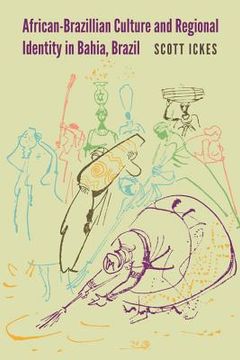Compartir
African-Brazilian Culture and Regional Identity in Bahia, Brazil (en Inglés)
Scott Ickes
(Autor)
·
University Press of Florida
· Tapa Blanda
African-Brazilian Culture and Regional Identity in Bahia, Brazil (en Inglés) - Ickes, Scott
$ 47.770
$ 79.610
Ahorras: $ 31.840
Elige la lista en la que quieres agregar tu producto o crea una nueva lista
✓ Producto agregado correctamente a la lista de deseos.
Ir a Mis Listas
Origen: Estados Unidos
(Costos de importación incluídos en el precio)
Se enviará desde nuestra bodega entre el
Jueves 30 de Mayo y el
Martes 11 de Junio.
Lo recibirás en cualquier lugar de Chile entre 1 y 3 días hábiles luego del envío.
Reseña del libro "African-Brazilian Culture and Regional Identity in Bahia, Brazil (en Inglés)"
"A sophisticated and thoughtful analysis of mid-twentieth-century cultural politics, recognizing both the fundamental changes that took place as Afro-Bahian cultural politics became incorporated into representations of Bahia and the limited material gains for Afro-Bahians during this period."--Hendrik Kraay, editor of Negotiating Identities in Modern Latin America Salvador, the capital of the state of Bahia, is often referred to as "Brazil's Black Rome." Culturally complex, vibrant, and rich with history, its African-descended population is one of the largest in Latin America. Yet despite representing a majority of the population, African-Bahians remain a marginalized racial group within the state as a whole. In African-Brazilian Culture and Regional Identity in Bahia, Brazil, Scott Ickes examines how in the middle of the twentieth century, African-Bahian cultural practices such as capoeira, samba, and Candomblé during carnival and other popular religious festivals came to be accepted as essential components of Bahian regional identity. Previously, public performances of traditionally African-Bahian practices were repressed in favor of more European traditions and a more "modern" vision. Newfound acceptance of these customs was a democratic move forward, but it also perpetuated the political and economic marginalization of the black majority. Ickes argues that cultural-political alliances between African-Bahian cultural practitioners and their dominant-class allies nevertheless helped to create a meaningful framework through which African-Bahian inclusion could be negotiated--a framework that is also important in the larger discussions of race and regional and national identity throughout Brazil.
- 0% (0)
- 0% (0)
- 0% (0)
- 0% (0)
- 0% (0)
Todos los libros de nuestro catálogo son Originales.
El libro está escrito en Inglés.
La encuadernación de esta edición es Tapa Blanda.
✓ Producto agregado correctamente al carro, Ir a Pagar.

